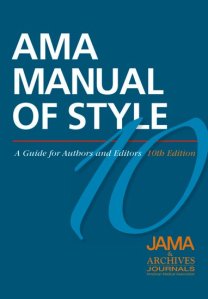by Olga Sushinsky
 If you’ve ever thought about pursuing a career in medical editing, you might want to familiarize yourself with the specifics of the industry. At first, it may appear daunting, but learning this craft is perfectly doable with a little help from print and online resources, such as medical dictionaries and industry-specific style guides. If you do come from a science background, the odds of success are in your favour, but if not, you can still master medical editing. Regardless of your level of expertise, it is important to have these resources on hand.
If you’ve ever thought about pursuing a career in medical editing, you might want to familiarize yourself with the specifics of the industry. At first, it may appear daunting, but learning this craft is perfectly doable with a little help from print and online resources, such as medical dictionaries and industry-specific style guides. If you do come from a science background, the odds of success are in your favour, but if not, you can still master medical editing. Regardless of your level of expertise, it is important to have these resources on hand.
The American Medical Association’s AMA Manual of Style
Most likely, you will be provided with log-in access to the AMA website when you receive a medical editing gig. However, it’s also a good idea to invest in a physical copy of the AMA Manual of Style if you plan to edit medical documents long-term. It is so much easier to look up the treatment of terms, grammar points, and other peculiarities of medical writing in the physical book. The price for the book is on the higher end, but this investment might be worthwhile if you hope to make a career in medical editing. If you cannot afford the book, you can still find a few free resources on medical editing online. The School of Pharmacy at Concordia University Wisconsin provides a document on citing references according to AMA style.
Nomenclature and taxonomy
One of the biggest challenges for new medical editors is trying to figure out if a particular term needs to be italicized. As you become familiar with scientific nomenclature, you’ll learn that bacterial genes need to be set in italics while other organisms should remain in roman type. The problem is, it’s often hard to tell them apart, especially if you’re new to the field. When you’re close to a deadline, a good online source can be your best friend. Fortunately, the website of the Centers for Disease Control and Prevention contains all the information about scientific names you’ll need when you’re trying to determine if a particular term needs to be italicized. It’s also a great place for checking correct spellings. The website of the International Commission on Zoological Nomenclature also provides some practical information about the differences between nomenclature and taxonomy.
Using articles in medical editing
Even if you’ve been in the editing business for a while, knowing when and what type of article to use with specific terms can be challenging. For instance, how would you know if the word “arthritis” or “sunburn” requires an article? Mastering Articles is a great reference for learning about articles in general, and it also provides a separate page on how to use the right articles for various conditions and diseases. Also, Health Science Center provides a page that breaks down all major uses of articles in the medical context.
Other
The word follow-up often comes up in medical texts, especially when used to describe patient-doctor appointments. This site on business writing illustrates when the word should and should not be hyphenated.
Finally, it’s not a bad idea to review proofreading marks, even if you mostly work onscreen. They often come in handy when you’re editing a PDF document in Adobe Acrobat.
One last word
If you do get a medical editing gig, chances are you’ll want to brag to all your friends on Facebook and Twitter that you finally got your dream assignment. Don’t do it right away, no matter how tempting it may seem. Most medical companies are strict about confidentiality. If you’re itching to make a post about your recent project, check first with your client in case there are any stipulations in the contract against discussing your work on social media. In my opinion, it’s best to keep your accomplishments in your resumé and in your portfolio to avoid complications.
BEST OF LUCK!
Olga Sushinsky is a freelance editor and blogger based in Toronto, Canada, specializing in academic editing and book indexing.
This article was copy edited by Erin Bankes.

Reblogged this on Wilson Editorial.
LikeLike